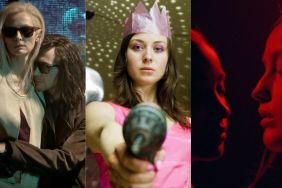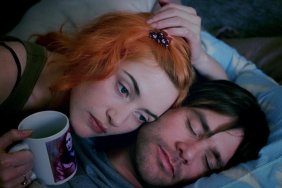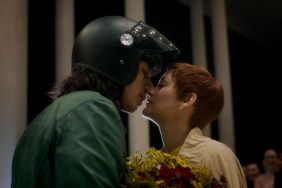
It’s no surprise Jim Jarmusch‘s vampire love story Only Lovers Left Alive isn’t a vampire film in the same vein as anything you’ve seen come out of Hollywood. These vampires don’t glitter and they’ve found more conventional ways to sate their blood lust than risking exposure or worse by draining human beings. There is, however, an overall sense of loneliness and the characters are quite moody as most vampires tend to be. Their disgruntled, “hate the world” nature speaks to the film’s larger theme, and while it isn’t exactly ground-breaking, in terms of execution, it’s quietly entertaining.
The story centers on centuries old vampire lovers Adam (Tom Hiddleston) and Eve (Tilda Swinton), the first of many recognizable/metaphorical/playful names used within the narrative. Though, when it comes to these two names Jarmusch credits his inspiration as not from the Bible, but from Mark Twain’s “The Diaries of Adam and Eve”, which itself has Biblical roots. I’ve never read Twain’s collection of short stories, which sounds like it was something more of a comedic look at the gender divide, but Only Lovers Left Alive is a rather cynical look at the degradation of society through the eyes of vampires that have lived through the times of Shakespeare and Schubert, two examples the film determines to be on the verge of becoming obsolete and/or forgotten in today’s society.
Though there is no time travel and the number of historical “celebrities” is limited to one, Only Lovers Left Alive shares a kinship with Woody Allen’s Midnight in Paris. Both films reflect on the glory days of the past and while Midnight is more hopeful, they both share a cynicism when it comes to today’s society, with “old soul” lead characters — in the case of Lovers it’s quite literal — hungering for the culture of the past and nervous for what the future has to offer.
We first meet Adam in Detroit of all obvious places. He’s a musician and has something of an admirer in Ian (Anton Yelchin) who’s blissfully unaware the man whose music he adores is actually a vampire. Ian is consistently bringing Adam new, classic instruments in exchange for wads of cash. As any vampire would, Adam clings to his seclusion, afraid of the celebrity status knocking on his door. Yet, his reclusive nature is only adding to his mystique as his music gains in popularity.
On the other side of the world, in Tangier, is Eve whose life we aren’t entirely privy to, though we do learn she shares evenings on occasion with Christopher Marlowe (John Hurt), a vampire himself. Of course Marlowe’s inclusion plays with the theory he was the true author of William Shakespeare’s plays. He has a connection with a French doctor that supplies him the “good stuff” when it comes to blood and at one point he says to Eve, “Wish I’d met him before I wrote Hamlet.” The film is loaded with such humor, it’s the “laughing quietly to myself” kind of humor, that doesn’t evoke guttural laughter, but slight bits of amusement.
Adam and Eve come together as Eve detects a melancholy tone in Adam’s voice, complaining of the “zombies” (humans) around him, prompting her to make the trip from Tangier to Detroit. Just after her arrival a lovers’ reunion is disturbed by the arrival of Ava (Mia Wasikowska), Eve’s younger sister, a character whose age speaks volumes given her actions.
Amid the subtle humor and excellent music, the main thrust of the film is the deterioration of the culture around these two central figures who’ve lived long enough to watch the world around them crumble. On top of not wanting to feed on today’s humans because of the inability to simply throw them in the river and claim tuberculosis, as Eve says at one point, their blood is diseased and could easily kill them. This considered, it’s obvious Adam and Eve are more a metaphor than anything else, representing a world lost to time and forgotten by today’s youth as an ignorance of history has not only poisoned the blood of society, but the natural environment as well.
Some may complain the film is too quaint or too cynical and I can’t argue. The humor is a bit on the nose and obvious, though given Jarmusch isn’t playing it for big laughs I found myself chuckling innocently at the clear fun all involved were having with the over-the-top material. To the cynicism, this is where it departs from Allen’s Midnight in Paris. While Allen’s film shows a clear appreciation for the past over the current day, it also shows it’s natural for humans to grow older and more appreciative of the days gone by as the future creeps into their lives and the fear of the unknown, or the chaos it appears to employ, can be daunting.
With Lovers, there isn’t necessarily a fear of the future generation, but a distaste for it. Some could argue Adam and Eve are hypocritical of the “zombies” around them. It would be a valid hypothesis to simply say Adam and Eve have lived too long. After all, given the fact they are vampires, and made it this far feeding on humanity, Adam chooses seclusion when the “zombies” find an appreciation for his music? What good does it do to wallow and judge those around you if you so clearly don’t want to do anything to make your world better? It seems shortsighted for him not to find hope in the fact people like his music.
In another instance, while watching a young singer perform and finding her absolutely ravishing, Eve says to him, “She’s going to be a big star,” to which he replies, “I hope not, she’s too good for that.” While I laughed and share Adam’s pessimism, isn’t it the responsibility of the artist to maintain their vision rather than become corrupted by an adoring fanbase and the tendencies that come with fame?
For Jarmusch, Only Lovers Left Alive is a film a long time in the coming as he hasn’t had a film I’ve felt was any good for well over a decade. Not only entertaining, Lovers clearly invites conversation and you can almost feel the joy everyone had in its making. Swinton and Hiddleston are fantastic as are Yelchin and Wasikowska, the latter finally breaking free of the whimsical, dead-behind-the-eyes pixie characters she so often plays and getting a chance to explore a character that’s actually interesting.
It must be said, however, Lovers is a slow burn that moves at a pace general audiences would consider lethargic. Jarmusch fans, on the other hand, should be pleased with what they see. Then again, many found something to enjoy in Limits of Control and Broken Flowers, and those same viewers may find this film too simple and almost too broad for their liking. I, on the other hand, found it refreshing and a fun piece of cinema unlikely to stand out as an end of year top ten qualifier, but certainly among the year’s honorable mentions.









